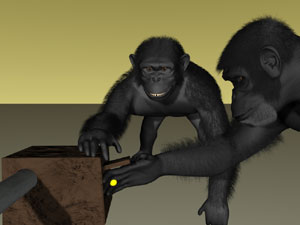Research
Multigenerational Transmission
Chimpanzees and children show faithful copying along a chain of multiple individuals

One chimpanzee manipulates the puzzle box while another individual watches.
Transferring knowledge through a chain of generations is a behavior not exclusive to humans. For the first time, researchers have shown chimpanzees exhibit generational learning behavior similar to that in humans. Unlike previous findings that indicated chimpanzees simply conform to the social norms of the group, this study shows behavior and traditions can be passed along a chain of individual chimpanzees. Using a research design that simulated transmission over multiple generations, researchers were able to more closely examine how chimpanzees learn from each other and the potential longevity of their culture.
In doing so, they confirmed that a particular behavior can be transmitted accurately along a chain of up to six chimpanzees, representing six simulated generations equaling approximately 90 years of culture in the wild. A comparative benchmark study with three-year-old human children, conducted by St. Andrews researcher Emma Flynn, PhD, revealed similar results, providing further evidence chimpanzees, like humans, are creatures of culture.


